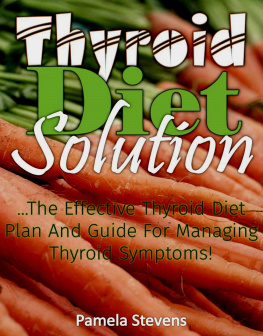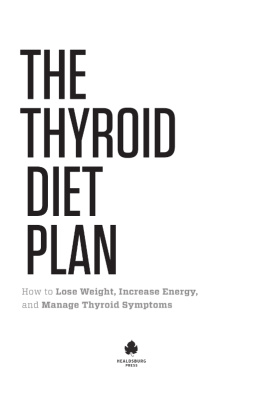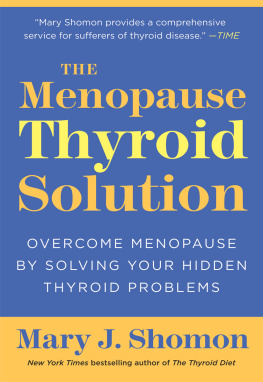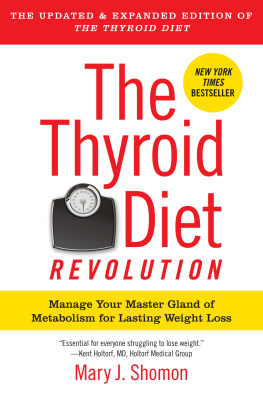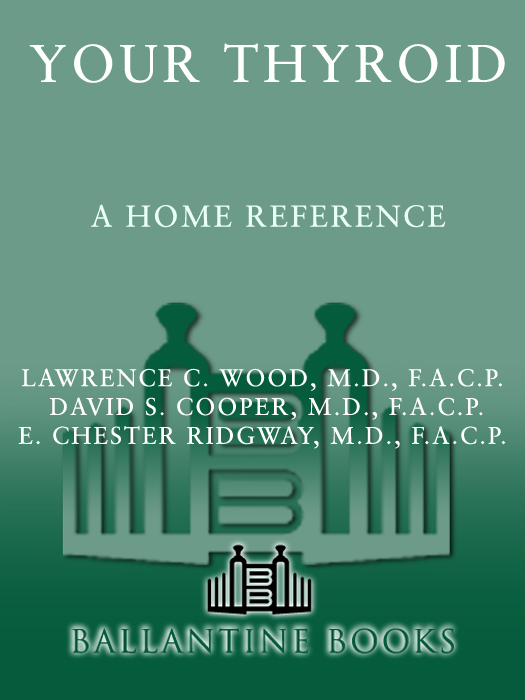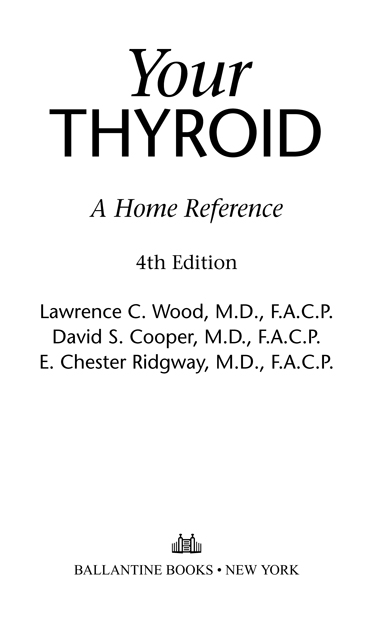No book can replace the diagnostic expertise and medical advice of a trusted physician. Please be certain to consult with your doctor before making any decisions that affect your health, particularly if you suffer from any medical condition or have any symptom that may require treatment.
2006 Ballantine Books Trade Paperback Edition
Copyright 1982 by Lawrence C. Wood, M.D.
All rights reserved.
Published in the United States by Ballantine Books, an imprint of The Random House Publishing Group, a division of Random House,
Inc., New York.
B ALLANTINE and colophon are registered trademarks of Random House,
Inc.
Originally published in a different form by Houghton Mifflin Company in 1982.
eISBN: 978-0-307-83390-7
www.ballantinebooks.com
v3.1
CONTENTS
1 General Information: Normal and Abnormal Thyroid Function, Thyroid Diseases, Thyroid
Tests, and Thyroid Treatments
Appendix 6: Suggested Reading about
Thyroid Disorders
Appendix 7: Worldwide Thyroid
Organizations for Patients
Appendix 8: Organizations for Physicians and
Health Professionals
PREFACE
We Wrote This Book for You
If you are struggling with an overactive or underactive thyroid and dont know it. There are nearly twenty-two million people with these conditions in the United States alone, and once they are recognized, there are good treatments for both conditions.
If any of your close relatives has a goiter or has been treated for a thyroid disorder. Many thyroid problems run in families, and maybe you should be checked, too.
If you have an overactive thyroid you may have relatives who have a failing thyroid. They should have their thyroids tested.
If you are pregnant. Thyroid problems are extremely common during pregnancy and in the year following delivery. During the pregnancy a malfunctioning thyroid increases your risks for miscarriage, a lowbirth-weight baby, prematurity, and toxemia (hypertension at the time of delivery). A simple test for thyroid peroxidase (TPO) antibody can usually tell if you have a risk for thyroid problems during or after the pregnancy, and a blood test for thyroid stimulating hormone (TSH) can help you and your doctor tell whether your thyroid malfunctions.
If you had neck irradiation in childhood for a condition such as cancer, acne, tonsillitis, or an enlarged thymus gland. Your risk for benign and cancerous thyroid tumors is increased (most thyroid cancers can be cured).
If you live near a nuclear reactor. A nuclear reactor accident or terrorist attack may release radioactive iodine into your environment. Potassium iodide tablets can help protect your children against later thyroid cancer.
If you were treated for a thyroid problem in the past. We now know that many thyroid problems need lifelong attention.
If you are taking thyroid pills for overweight, infertility, sluggishness, or depression. Your treatment probably needs to be reviewed and updated.
If you are facing a test, a medical treatment, or an operation for your thyroid. This book will tell you what it means and what it will be like.
If you are taking or thinking of taking kelp. The iodine in kelp could make a lumpy thyroid dangerously overactive. If you are pregnant, it could make your unborn babys thyroid enlarge or fail.
If you take insulin for diabetes, need vitamin B12 for anemia, have prematurely gray hair, or have white skin patches known as vitiligo. Your risk for an overactive or underactive thyroid may be increased, and perhaps your thyroid should be checked.
PREFACE TO THE FOURTH EDITION
In 1981, we three were practicing together in the Thyroid Unit of the Massachusetts General Hospital when we discovered a mutual interest in patient education and a desire to reach out to thyroid patients. We wrote this book for people who knew they had a thyroid problem, to review and expand upon information given to them by their physicians. Also, we hoped to reach that wider audience: the many millions of people with unrecognized and untreated thyroid conditions.
We continue to be especially grateful for the helpful comments of many patients and colleagues since Your Thyroid was first published in 1982. Extensively revised and expanded, this Fourth Edition carries forward the information you need about important new advances worldwide.
We know more about tests for diagnosing hypothyroidism or hyperthyroidism, and more about thyroid dysfunction after pregnancy. Threats from nuclear reactors and from worldwide iodine deficiency are greater, not less.
Finally, in this edition of our book we have offered new information about keeping up to date lifelong regarding your thyroid problem. In programs offered by the Thyroid Foundation of America (TFA), the American Thyroid Association, and other supporting organizations, you can obtain information about current research and about meetings of patient and physician organizations, and be informed promptly about important thyroid-related events in the news.
The TFA will also keep you up to date on new research on thyroid issues in the news, patient stories, and international thyroid developments. It will guide you to overall better health with nutritional and fitness programs ().
We also have added an appendix describing help available for thyroid patients throughout the world. Twenty-one thyroid patient organizations in sixteen different countries offer help in many languages and in many ways often unique to that particular country and culture. Indeed, if you want to start a thyroid patient organization in your country, the TFI will help you with information and support.
Our thanks to our agent, Stedman Mays, at Connie Clausen Associates; to our editors, Ruth Hapgood and Joanna Bowman; and to the supportive staff at Random House. We welcome back Linda Hoffman-Kimball, whose illustrations have again helped clarify many points in the textoften with a delightful touch of humor in the characters she creates. Finally, we want to express our appreciation to the many readers who have written to us with helpful criticism and suggestions. Please keep writing, and accept our thanks for your important role in developing this new effort to keep you informed and up to date about thyroid problems.
D.S.C., E.C.R., L.C.W.
CHAPTER 1
General Information:
Normal and Abnormal Thyroid
Function, Thyroid Diseases, Thyroid
Tests, and Thyroid Treatments
Your thyroid is one of the many glands in your body that make special chemicals known as hormones. Hormones travel in your bloodstream throughout your body to affect many different parts of your system, including your brain, heart, liver, kidneys, muscles, bones, and skin. Therefore, it is not surprising that a change in any hormone level can produce abnormalities all over your body. Once they arrive at a particular tissue, hormones interact with receptors located either on the outside of the cell or inside the cell in the cytoplasm or nucleus to trigger a certain function. The particular hormone made by your thyroid gland acts on receptors located in the nucleus, affecting the rate at which many bodily processes happen.
Normally, your blood level of thyroid hormone is constant, with little day-to-day variation. However, if the gland becomes diseased, it may produce high thyroid hormone levels that may speed up body processes, causing symptoms like rapid heartbeat (palpitations), nervousness, frequent bowel movements, and weight loss as you burn up calories more rapidly. By contrast, a poorly functioning gland may produce less than a normal amount of thyroid hormone, which may slow your heartbeat and make you tired, depressed, and constipated. A low thyroid hormone level also may cause your skin, hair, and fingernails to grow more slowly, so they become rough, dry, and brittle. You may gain some weight, but usually no more than three or four pounds. This is primarily due to fluid retention rather than an increase in body fat. In short, if your thyroid is underactive, you will probably feel generally run down.


